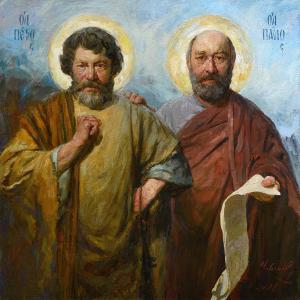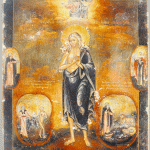
Not only did Paul come to believe in Jesus, he also came to believe that he had been given a special mission by Jesus, one which granted him apostolic authority. Nonetheless, he knew he couldn’t act upon that mission until he was accepted by the church. This required him to humble himself, which was not easy for him to do. He had to address those whom he previously persecuted, explaining to them why they should accept him, not only as a Christian, but as someone Jesus chose to be a leader with apostolic authority. To do this, he would also have to accept that others would have some authority over him, that many, whom he might previously have looked down upon as being his inferiors (because of their lack of education and their social background) were to be his superiors. He had to overcome his own biases and prejudices, even as others would have to overcome those they had against him.
Paul knew, just as much as he knew Jesus has risen from the dead, that his mission was valid, and so he would do what he needed to do in order to follow through with it, even if it meant changing his whole perspective on life (something which we see is constantly in effect in his writings, as the challenges and issues he addressed were those he had to deal with himself). It took much for him to accept the fact he couldn’t continue his mission and do it properly until it was given official approval, to show that the church had judged it as valid. He also knew he had to take time, to prepare himself, so that he can prove himself, which is why he took time before he went and addressed Peter and James:
Then after three years I went up to Jerusalem to visit Cephas, and remained with him fifteen days. But I saw none of the other apostles except James the Lord’s brother (Gal. 1:18-19 RSV).
Paul met with Peter because he knew Peter had to validate his charism if it were to be officially recognized by the church. Peter was the leader of the apostles while Christ was alive, which had him become the official head of the church after Jesus’ ascension. This is why Peter was the one who had to confirm that Gentiles could be brought into the church. Now, Peter had to confirm that Paul, who had once been an enemy of the church, had been made an apostle. His confirmation didn’t make it real, but only served to have it verified and accepted by the church, so that the faithful could know that Paul’s conversion was legitimate and Paul had a special relationship with Jesus which somehow made him an apostle. James, on the other hand, held an important role in the church as he was the leader of the church in Jerusalem, making him as it were its first bishop, which is why Paul knew he should meet with him as he should meet with the leader of any Christian community he should visit. The other apostles did not have the same kind of jurisdiction as Peter or James in Jerusalem, which is why Paul didn’t need to meet with them.
Paul, it would seem, did what he felt he was required to do, but he did as little as was necessary, for he wanted to be off on his own. He wanted to make it clear that he was not relying upon the other apostles for his charism, that is, his apostolic authority wasn’t being handed down to him by them, but only that it was being confirmed by them. For he wanted to make it clear that it was Jesus, and no one else, who had given him his mission and his authority; indeed, it was in that way he could and would confirm Jesus’ resurrection from the dead, because that was the only way he could have received such a commission. Thus, though he would eventually have his charism confirmed so it can be affirmed by the church, he wanted to make it clear, it was not Peter and James who gave him his mission, it was Jesus:
For I would have you know, brethren, that the gospel which was preached by me is not man’s gospel. For I did not receive it from man, nor was I taught it, but it came through a revelation of Jesus Christ. For you have heard of my former life in Judaism, how I persecuted the church of God violently and tried to destroy it; and I advanced in Judaism beyond many of my own age among my people, so extremely zealous was I for the traditions of my fathers. But when he who had set me apart before I was born, and had called me through his grace, was pleased to reveal his Son to me, in order that I might preach him among the Gentiles, I did not confer with flesh and blood, nor did I go up to Jerusalem to those who were apostles before me, but I went away into Arabia; and again I returned to Damascus (Gal. 1:11-17 RSV).
Paul wanted the Galatians to understand that revealed truth transcended what humanity could and did expect of it, and because it was revealed, it could be revealed directly by God. It didn’t have to be handed over to him by anyone else. But, again, he knew that the truth he had received had to be validated, to make sure that it could be integrated with the truth which was already known and accepted by the church. He understood this was one of the many roles of the church, that is, it should stand as the pillar and ground of the truth where any particular aspect of the truth, wherever it is found, can be appreciated and drawn in, finding its proper place because it is properly integrated with the greater whole. This is why it is important that those who think they have been given some element of the truth, some revelation of value, such as those who think they have been visited by some apparition or given some special supernatural locution, should be willing to have what they have received be humbly examined, to make sure it can and does have a way to connect to the greater truth (in other words, though the truth is not established by such confirmation, such confirmation is necessary to help make sure there is no deception, internal or external, going on by those who claim to have some sort of private revelation which is meant to be shared with others).
Paul knew what he received was true; it was confirmed by Peter and James, but that confirmation isn’t what made it true, only it made sure that Christians knew Paul was not being deceived (either by someone or something else, or even by himself) and that he truly was given an apostolic mission by Jesus; this was necessary because if there were a problem with his claim, and he didn’t have such a mission, acting upon it as if he did would likely lead many astray (including Paul himself). If Paul understood this, then all who claim private revelation should heed the humility of Paul, and follow after him, knowing that if what they have is true, it will be legitimized. Private revelation, even if true, requires affirmation by the church in order for it to be shared as something which can be believed by others. We should be cautious when dealing with apparitions, remembering that the church must have a role in determining their credibility. We are not to flaunt spiritual experiences as if they make us great – that is prelest – instead, even if and when we have such experiences, we must have them confirmed by the church if we are to use them to represent the faith to others (or, especially, to use them as to suggest we have a special calling).
Paul, one of the greatest saints in Christian history, had to have his mission confirmed. Even then, once it was confirmed by Peter and James, that did not mean it all went smoothly for him or for the church. Paul put much of himself in the middle of his work, and not all of that was good: he could be hotheaded, he could be demanding, and he could and often did do things which caused friends and helpers to go their separate way from him. Thus, even those who have legitimate missions and special charisms are not going to be perfect, and we must not confuse everything they say and do as related to that charism, just as we must not confuse everything connected with legitimate apparitions and locutions represent the apparition but sometimes, instead, they can and do represent the persons’ limited understanding of the private revelation and grace they have received. What is important is the mission, what is important is the grace which comes from it, and this Paul understood, which is why, despite himself, despite the way he can and did cause all kinds of trouble, Peter and James were able to validate his apostolic authority. For they saw Paul, with all his bluster, with all his ego, was changed and made for the better, and he truly had something to say and offer to the church, not because he was an extraordinary man, but because he had an extraordinary encounter and relationship with Christ.
Stay in touch! Like A Little Bit of Nothing on Facebook.
If you liked what you read, please consider sharing it with your friends and family!











